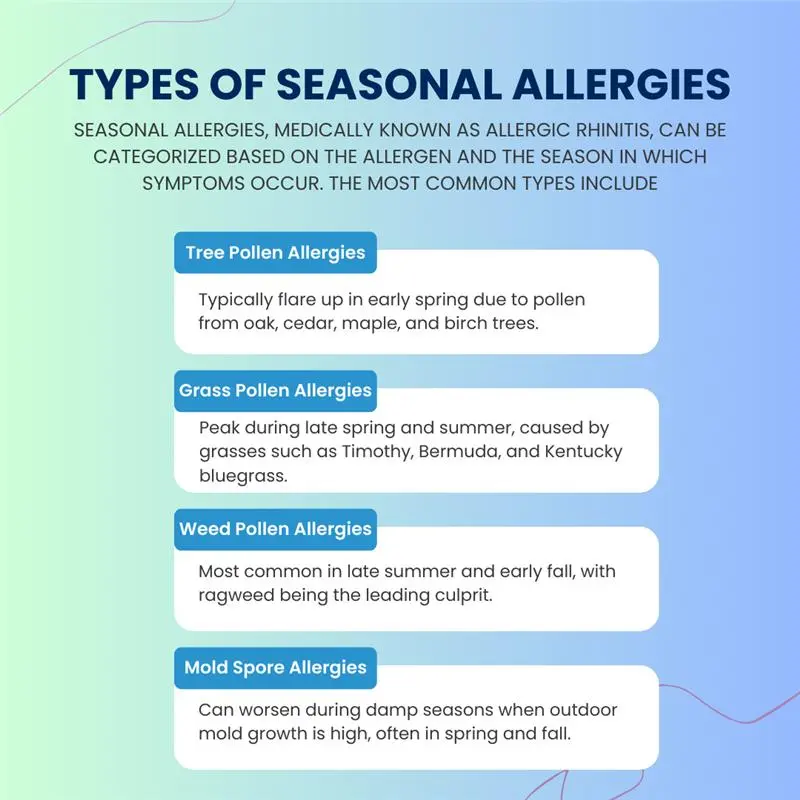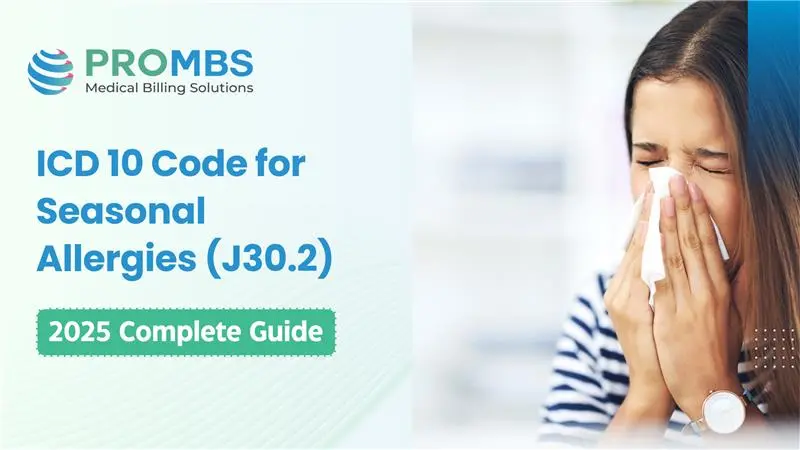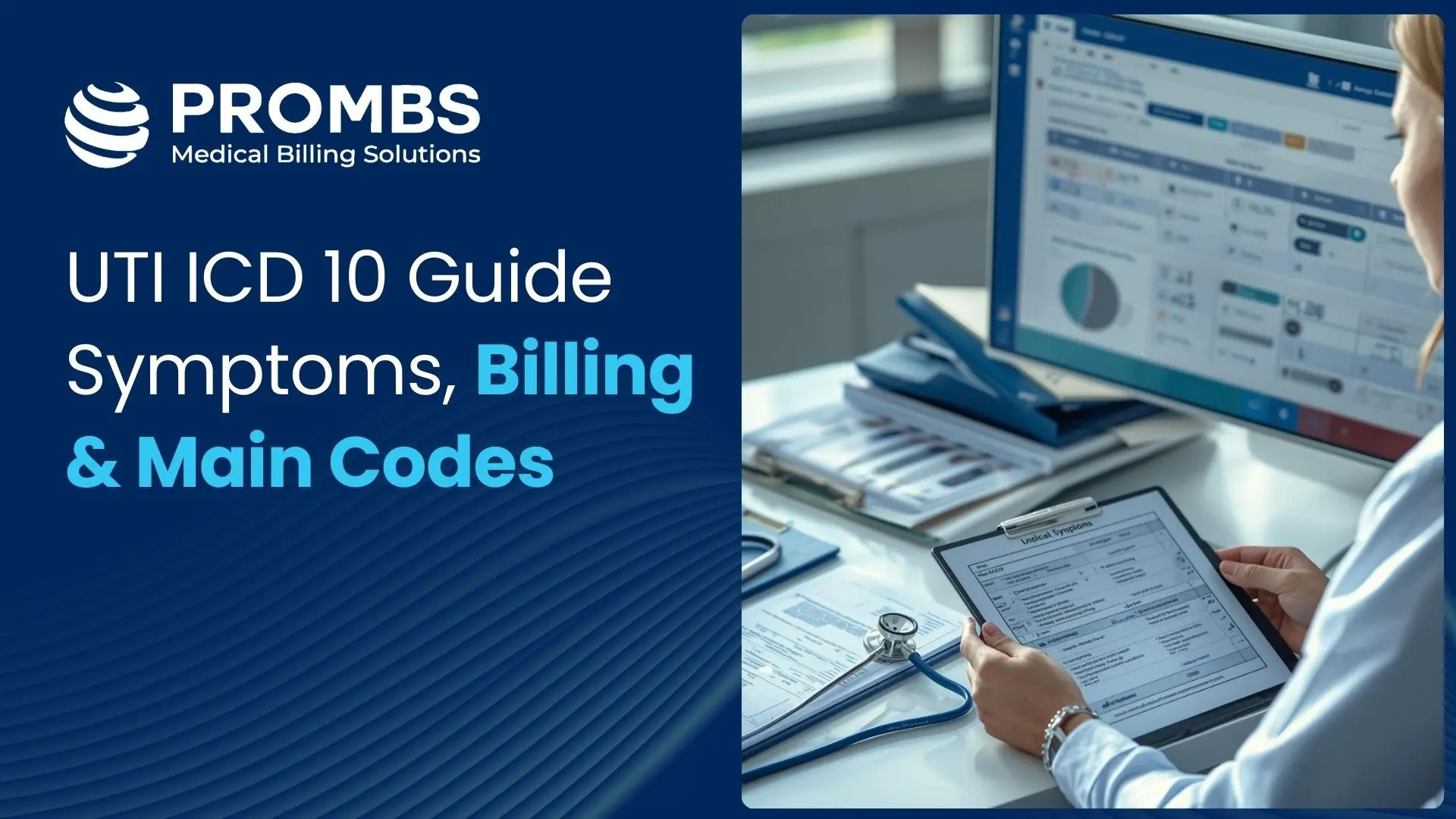Correct use of the ICD 10 code for seasonal allergies (J30.2) is critical for accurate medical documentation, claims processing, and payer compliance. Seasonal allergic rhinitis, commonly known as hay fever, is one of the most frequently reported allergy conditions in the U.S. and worldwide. Failure to assign the proper code often leads to denials, delayed reimbursement, or compliance issues. This guide breaks down the condition, symptoms, coding details, related ICD-10 and CPT codes, documentation requirements, and common billing pitfalls.
What Are Seasonal Allergies?
Seasonal allergies, or hay fever, occur when the immune system overreacts to allergens such as pollen, grass, or mold spores. These allergens trigger histamine release, resulting in nasal, ocular, and respiratory symptoms. The ICD 10 code for seasonal allergies (J30.2) specifically identifies allergic rhinitis caused by pollen and other seasonal triggers.
Symptoms of Seasonal Allergies
- Sneezing
- Runny or congested nose
- Itchy, watery eyes
- Postnasal drip
- Cough and throat irritation
- Headache or sinus pressure
- Fatigue due to poor sleep quality

Causes of Seasonal Allergies
The underlying cause of seasonal allergies is an overreaction of the immune system to harmless airborne particles (allergens). When a person with seasonal allergies inhales pollen or mold spores, their immune system mistakenly identifies them as threats and releases histamines, leading to symptoms like sneezing, congestion, and itchy eyes.
Key causes include:
- Pollen Exposure: Trees, grasses, and weeds release pollen into the air during their growing seasons.
- Mold Spores: Thrive in humid or damp environments, especially in leaf piles, soil, and decaying vegetation.
- Genetic Predisposition: A family history of allergies or asthma increases the likelihood of developing seasonal allergies.
- Environmental Factors: High pollen counts, outdoor exposure, and climate changes can intensify symptoms.
ICD 10 Code for Seasonal Allergies (J30.2)
- Code: J30.2
- Description: Other seasonal allergic rhinitis
- Use: To document hay fever caused by pollen, grass, ragweed, or other seasonal allergens.
- Excludes: Perennial rhinitis, vasomotor rhinitis.
The ICD 10 code for seasonal allergies (J30.2) must be selected when the patient’s symptoms are clearly linked to seasonal allergens and not due to chronic or non-specific causes.
What are the Related ICD-10 Codes for Allergic Rhinitis?
| ICD-10 Code | Description |
|---|---|
| J30.1 | Allergic rhinitis due to pollen |
| J30.2 | Other seasonal allergic rhinitis |
| J30.81 | Allergic rhinitis due to animal hair and dander |
| J30.89 | Other allergic rhinitis |
| J30.9 | Allergic rhinitis, unspecified |
When to Use and When Not to Use Related ICD-10 Codes
Each ICD-10 code for allergic rhinitis has a specific application depending on the identified allergen and clinical presentation. J30.1 should be used when symptoms are clearly caused by pollen exposure, while J30.2 applies to other seasonal allergens such as grass, ragweed, or mixed seasonal triggers. J30.81 is reserved for allergic reactions due to animal hair and dander, and J30.89 covers allergic rhinitis caused by less common allergens not classified elsewhere. J30.9 is only appropriate when the cause of allergic rhinitis is unknown and cannot be determined.
Providers should avoid using unspecified codes like J30.9 when the allergen is identifiable, as specificity reduces claim denials and ensures proper documentation. Similarly, using codes that do not match the actual trigger, for example, assigning J30.1 for a patient allergic to ragweed instead of pollen can lead to reimbursement issues. Correct selection ensures medical necessity is supported and aligns documentation with payer expectations.
What Are the Common CPT Codes Paired with J30.2?
| CPT Code | Purpose |
|---|---|
| 99213 | Office or outpatient visit, established patient |
| 95004 | Percutaneous allergy skin tests |
| 95024 | Intradermal allergy testing |
| 95115 | Single immunotherapy injection |
| 95117 | Multiple immunotherapy injections |
Using the ICD 10 code for seasonal allergies (J30.2) in conjunction with these CPT codes supports medical necessity for allergy testing, office visits, and immunotherapy.
Why Claims with ICD-10 Code for Seasonal Allergies (J30.2) Get Denied
Even though the ICD-10 code for seasonal allergic rhinitis (J30.2) is one of the most frequently used allergy-related codes, claim denials are common if the diagnosis is not supported with precise documentation and proper CPT alignment. Understanding the underlying causes of denials helps both providers and coders ensure compliance with payer requirements and reduce revenue loss.
Non-Specific Documentation
A major reason for denials is vague or incomplete documentation. Many providers document only symptoms such as nasal congestion, sneezing, or itchy eyes without linking them directly to allergen exposure. For example, writing “runny nose” in the clinical notes does not establish medical necessity for billing J30.2. Payers expect a clear statement that the patient’s symptoms are triggered by seasonal allergens like pollen, dust, or mold spores, and without that correlation the diagnosis appears unsupported.
Mismatch with CPT Codes
Claims are frequently rejected when the ICD-10 diagnosis code and CPT procedure code do not align. A common example is billing for allergy testing (CPT 95004) when the diagnosis only reflects nonspecific symptoms rather than a confirmed seasonal allergic rhinitis diagnosis. In such cases, insurers consider the service medically unnecessary because the diagnosis does not substantiate the test performed. Ensuring that J30.2 is appropriately paired with related diagnostic or therapeutic CPT codes is critical to avoid this type of denial.
Use of Unspecified Codes
Another issue arises when coders use J30.9 (allergic rhinitis, unspecified) instead of J30.2. Although unspecified codes may be acceptable in rare circumstances, payers generally favor the highest level of specificity. Submitting J30.9 in place of J30.2 signals to the insurer that the provider has not accurately identified the patient’s condition. This not only increases the risk of denial but may also trigger additional requests for records, delaying reimbursement.
Missing Provider Notes and Clinical Correlation
Even when the correct diagnosis code is selected, claims can still be denied if provider notes lack sufficient detail. Insurers expect documentation that establishes clinical correlation between allergen exposure and patient symptoms. For instance, notes should indicate that the patient experiences worsening nasal congestion and sneezing during spring when pollen counts are elevated. Without explicit reference to allergen exposure, insurers may conclude that the diagnosis is speculative and deny the claim despite accurate coding.
Failure to Support Medical Necessity
Finally, payers require that medical necessity be fully demonstrated. If a provider bills for advanced testing or immunotherapy without showing that the patient failed first-line treatments such as antihistamines or nasal corticosteroids, the claim is likely to be denied. Insurance companies often scrutinize allergy-related claims to ensure that the level of service is justified by the severity of symptoms and prior treatment history.
What Are the Documentation Requirements for ICD-10 Code J30.2?
Proper documentation is crucial when using the ICD-10 code for seasonal allergies (J30.2) to ensure clean claims and prevent payer denials. Providers should clearly note the onset and duration of the patient’s symptoms while also specifying the seasonal pattern, such as whether the condition occurs in spring, fall, or other allergen-heavy months. This level of detail strengthens the clinical picture and supports the medical necessity of the diagnosis.
In addition, the patient’s allergen exposure history should be recorded, noting common triggers such as pollen, grass, or ragweed. If allergy testing is performed, the diagnosis must be linked to those results to validate the coding. Finally, complete compliance requires that the provider signs and dates all documentation, confirming the accuracy of the record and ensuring adherence to payer policies.
How Pro-MBS Can Help Ensure Accurate Coding
Pro-MBS, or Practice Management and Billing Solutions, can significantly enhance the accuracy of coding for ICD 10 code for seasonal allergies (J30.2) by providing integrated tools for documentation, claim review, and compliance tracking. These systems often include automated prompts and checklists that remind providers to record critical details such as onset, duration, seasonal patterns, and allergen exposure, ensuring that each claim is fully supported. By linking ICD-10 codes to appropriate CPT procedures within the software, Pro-MBS reduce the risk of mismatched coding that often leads to denials.
Additionally, Pro-MBS offer real-time validation against payer rules and industry standards, flagging incomplete documentation, unspecified codes, or missing provider signatures before claims submission. This proactive approach minimizes rejections, accelerates reimbursement, and ensures adherence to compliance requirements. For allergy-related claims, the combination of accurate ICD-10 selection, thorough documentation, and automated software checks provided by Pro-MBS creates a robust framework that supports both clinical and billing accuracy.



